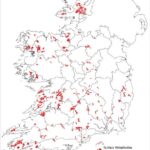Changes to the hydromorphology ranks as the second most significant…
Significant Pressures: Urban Waste Water
The implementation of the Urban Wastewater Treatment Directive has led to a significant reduction in nutrients and organic material polluting surface waters. However, Ireland is still not fully compliant with this directive; pollution from some urban wastewater treatment facilities has not yet been adequately addressed, including pollution from smaller agglomerations, storm water overflows and micropollutants that damage the environment.
Discharges from urban wastewater treatment plants and agglomeration networks (UWW) have been identified as the fourth most prevalent significant pressure in the country. Nearly 200 waterbodies or 12% of all waterbodies ‘At Risk’ of not achieving their environmental objective under the Water Framework Directive have UWW as a significant pressure. Waterbodies are categorised as being ‘At Risk’ of not achieving its WFD objectives where the monitoring data shows evidence that water quality is impacted, and actions are required to deliver water quality improvements. This is based on the most recent characterisation assessment using data up to 2021.







